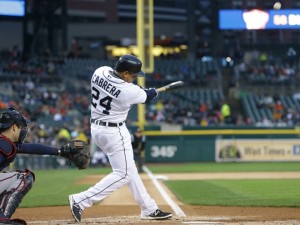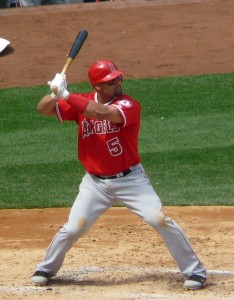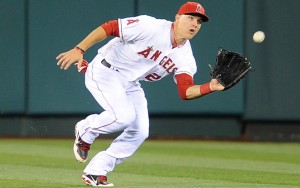Miguel Cabrera, heading into this season as the best hitter in baseball, is batting .227 through his first 11 games. He is recovering from October sports hernia surgery and is continuing to rehab his core muscle strength, but his early struggles jump out and made me want to write about baseball’s obsession with huge, insanely ridiculous long-term guaranteed contracts.
During spring training Cabrera signed an eight-year extension with the Detroit Tigers worth $248 million. On top of his current two-year, $44 million deal, that equates to a mind-boggling 10-year, $292 million contract for the 30-year-old Venezuelan, who won’t have any problem affording his kids’ private education in years to come.
Cabrera was a free-agent-to-be in two years time, making this deal more than a little confusing. The Tigers, who are World Series contenders every season in the current game, have a lot to thank ‘Miggy’ for, but with history telling us that with age comes beauty – wait, lowering performance – could they not have waited until his current deal rolled out to see if the slugger regresses at all? The fact that Cabrera loves the city of Detroit, and feels the love from the fans on a daily basis, tells me that the Tigers have some leverage here and could have re-signed Cabrera after the 2015 season if they wished.
That’s assuming he performs as he has done in recent seasons, which has resulted in back-to-back Most Valuable Player awards and an appearance in the World Series and ALCS, respectively. But Detroit didn’t look at history. They didn’t learn. GM Dave Dombrowski, one of the shrewdest men in the game, didn’t learn either. These fairy-tale contracts have become all too familiar, with Albert Pujols, Alex Rodriguez, Joey Votto and Prince Fielder just several examples that prove it. Robinson Cano, the 31-year-old second baseman who won a championship in 2009 with the Yankees, was offered seven-years and $175 million from New York but unsurprisingly turned it down and took more money from Seattle, signing to the north-west for 10 years and $240 million. Money or success? It won’t take you long to answer the question ‘do players care more about money than winning?’
And that frustrates me. It really does. I understand that players want to secure their future, their kids’ future and the generations to come, and if their family have grown up in poverty for decades, they have the opportunity to permanently move them out of that bracket. It’s the same predicament college basketball players have after their freshman year if they are able to go pro. Do they play another year at college or secure their financial future? But in the cases of most of these players – like Cano, like Pujols – they have already made a ton of money and surely are more motivated to build a legacy that can be unmatched. Both have won World Series championships with their former teams, but being the best second baseman in the game or the previous best hitter in the game doesn’t stand for much once you reach the north side of 30 and your performance starts to diminish.
Derek Jeter, retiring after the 2014 season, may have the edge over Cal Ripken Jr. in the shortstop stakes following five championship rings, not because he earned millions and millions of dollars. 
Back to Cabrera, and his chances of securing a three-peat of MVP’s is diminishing somewhat because of Mike Trout, now officially the best player in baseball. Trout, of the LA Angels, signed the second-largest extension ever for a player with less than three years of MLB service; six years and $144.5 million. Trout will only be 29 when his new deal expires, which means he will be able to sign a Cabrera-like contract, and probably more if he keeps up his performance, in the prime of his career. But haven’t the Angels already secured the prime years of Trout? This is where it makes sense, and where most GM’s should now be looking to follow with their best talent. Trout can hit for power, steal bases and play great defence in centre-field. He is a five-tool player and an incredible athlete. His new average annual value stands at $24.1 million, and if predictions are accurate he will sign the biggest contract in the sports history before he turns 30. Whoever that team may be, Trout and more importantly the Angels have won with this deal. They have bought out Trout’s free agency years and crucially have him under wraps in what are guaranteed to be his best years. Trout will receive big money like all the others, but for the Angels it’s less risky and much shrewder. I never thought ‘shrewd’ and $144.5 million would be in the same sentence. Cabrera is a brilliant hitter, but he plays first base, a continually less important position, so his overall value is less. Add that he has a body type sure to give way as he approaches his late-thirties, and wasted money starts to come into it.
Of course, new TV deals around the league mean a $9 billion business is only getting richer, and any down years in these huge contracts, and heck there are a lot of them, can be swallowed and shouldn’t affect money-making machines like Detroit too much. But just to show you the ridiculousness of these deals, Albert Pujols, who hit 445 home runs with the St. Louis Cardinals, is now 34 years of age and owed at least $23 million in every season until 2021 with the Angels. In that final year, Pujols is owed $30 million guaranteed. He will be 41.
Is that ethical? Is that rational? You could say not, but despite some general managers going in the opposite direction, the temptation to increase revenue through raised ticket and jersey sales means players will continue to sign mega-deals, even if baseball continues to show that big years and aging players is not a good mix.
